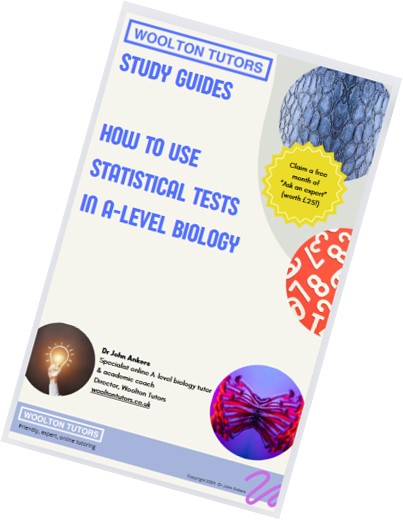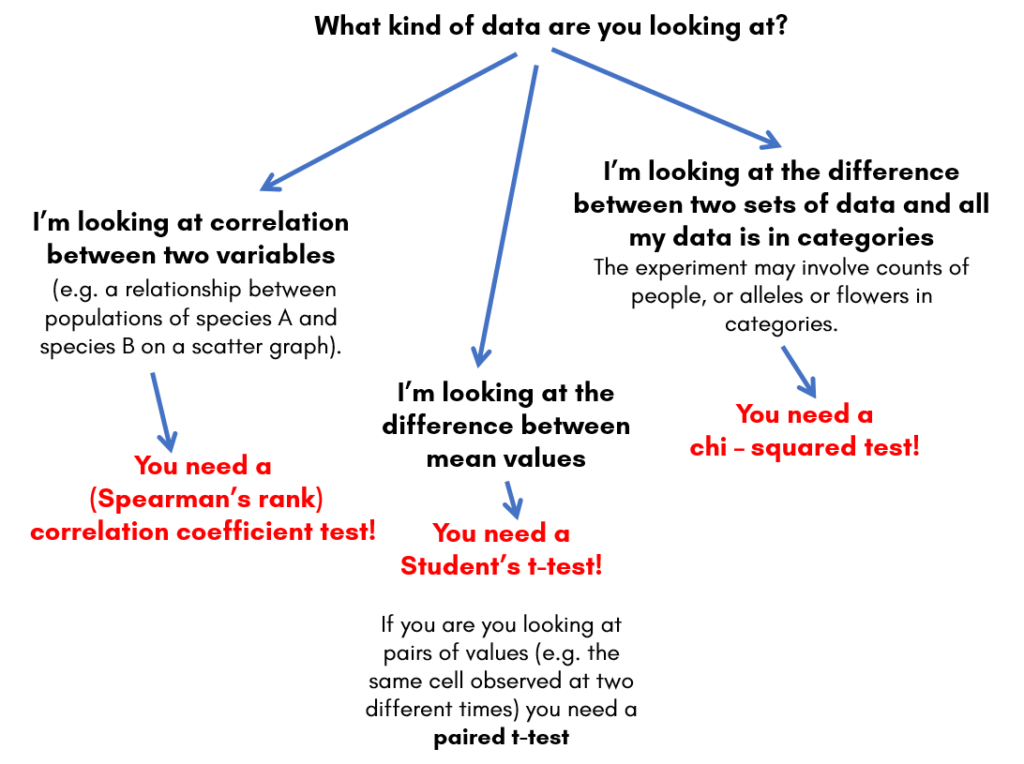The problem with biological processes is that they’re messy. The same measurements taken on different days are likely to be slightly different (in some cases very different) due to the random nature of biological molecules sloshing around in cells. Scientists call this randomness “noise”. Noisy measurements might fool us into thinking a change we observe in our experimental data is important, when in fact it’s just the universe being random. We need a way of spotting what stands out – what is significant – among all the noise – this is where we turn to statistical tests and the p-value in A-level biology.
Why do we need statistical tests and the p-value in A-level biology?
Statistical tests are simply tools scientists use to spot important results rising above the randomness or “background noise” of the universe (or inside a cell). We carry out statistical tests in A-level biology because even if a change in our data looks dramatic by eye (we might say one bar on a graph is “obviously” higher than another), the test provides the unbiased reassurance to make our conclusions confidently.
What is significance in A-level biology?
Put simply, some statistical tests work by setting a threshold (called the “confidence level” A-level biology) and then mathematically analyse the difference between two sets of data. The resulting number, called the p-value, is compared with the threshold to see if it’s higher or lower (see below for an example). Stats tests allow us to separate “real” biological differences from differences that could be explained by randomness in our measurements. Only differences rising above this noise gain the title “significant”.
Strictly speaking, scientists will only draw conclusions if they have a significant statistical test to back them up. Scientific journals expect statistical tests, sometimes lots of them (we discuss how to choose a statistical test in another post).
What is the null hypothesis in A-level biology?
In order to be strict with our conclusions (because if we aren’t, other scientists will be!) we begin with the (rather pessimistic) view that there is no significance in our results – that there is no difference between our control data and or test data, perhaps drug X doesn’t reduce the size of cancerous tumours. This doom and gloom starting point is called the “null hypothesis”, and it’s a great place to begin – because statistics can argue that it’s wrong! If the null hypothesis is wrong or “rejected”, this means we can conclude there has been a significant effect in our data – drug X does treat the cancer.
How do we use a p-value in A-level biology?
Scientists, and A-level biology exam papers, often use a p-value threshold of 5% or 0.05. But what does that mean? If a statistical test gives us a p-value of less than this threshold, there is a less than 5% probability that the behaviour we see in our data is due to random chance – i.e. rather than noise explaining differences in our data, there is over 95% probability the difference in the data is “real”. So we “reject” the null hypothesis, and conclude that the difference we see is significant.
Imagine a graph with two bars, both representing tumour size in patients, but one involves treatment with our new drug, Drug X. The size of this bar “looks” smaller, a statistical test gives us a p-value of 0.04. What does this mean, and what can we conclude?
A full exam answer might be:
The null hypothesis is that Drug X does not have an effect on cancerous tumour size.
The statistical test shows a p-value of 0.04 (or 4%) meaning there is a less than 5% probability that the difference between the data with the drug or without is due to chance (i.e. it’s far more likely that the difference isn’t due to chance) As our confidence threshold is 5%, we can conclude that the difference is significant, so we reject the null hypothesis and conclude the drug X does have a (significant) effect.
Exactly the same logic is applied analysing data in different contexts in A-level biology – from crop growth, to muscle strength to blood glucose levels.
Hope this helps!
 There’s much more help with statistical tests, p-values, significance etc. (and model answers to statistics exam questions) in our eBook “How to use statistical tests in A-level biology”, available here.
There’s much more help with statistical tests, p-values, significance etc. (and model answers to statistics exam questions) in our eBook “How to use statistical tests in A-level biology”, available here.
If you’d like to work through some A-level biology statistics questions, from exam boards like AQA, please get in touch with me at Woolton Tutors, and we can set up some online A-level biology tutoring sessions. Alternatively, AQA students might be interested in my weekly A-level biology masterclass sessions for practice on exam technique.
Best wishes,
John
Dr John Ankers
Specialist online A-level biology tutor and academic wellbeing coach





